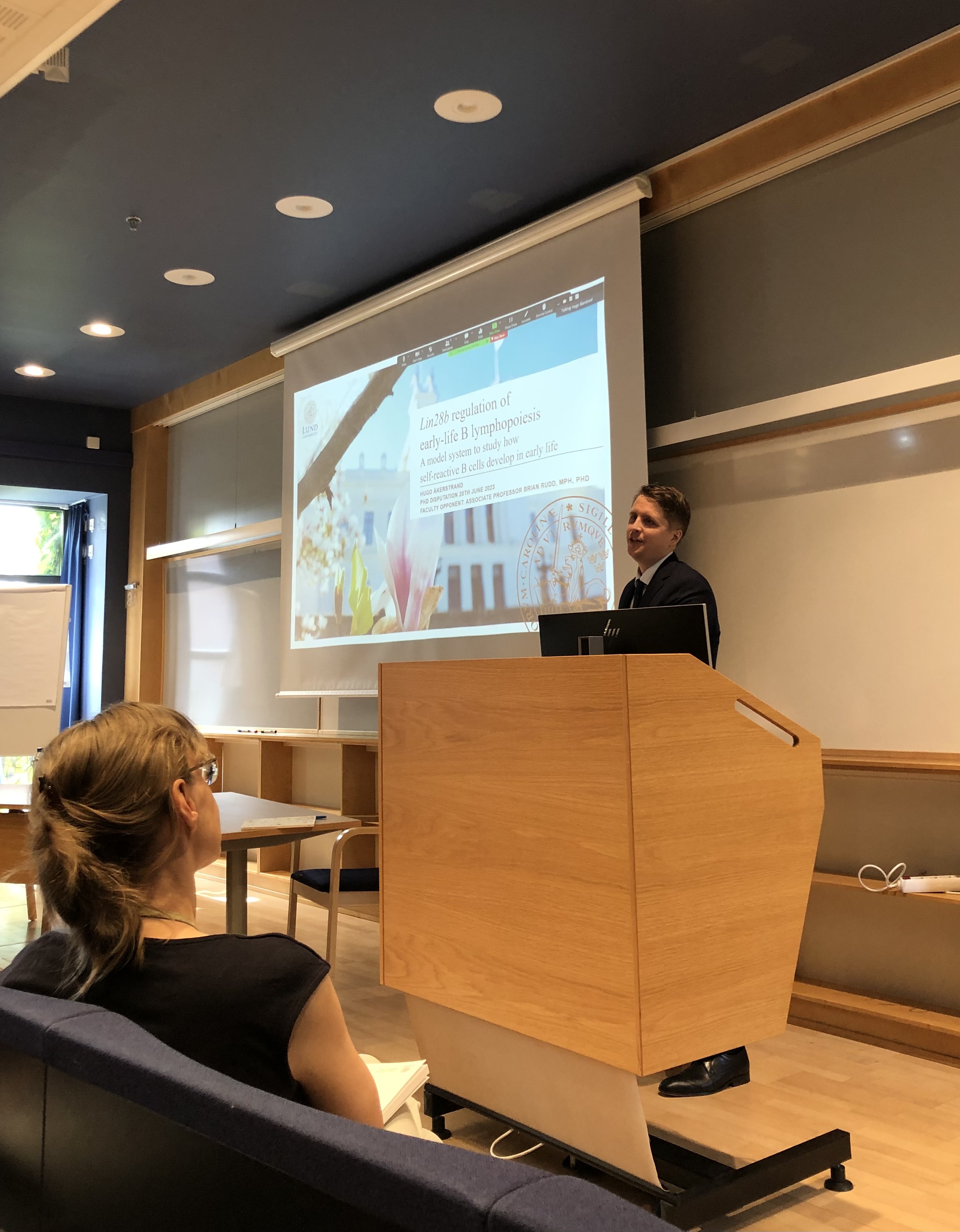



Last year was a blur in the Yuan lab. So many grant applications / conferences / deadlines. Looking back, one of the absolute highlights was Hugo’s thesis defence in June.
The stars were aligned and we got Hugo’s paper accepted in the last possible minute to make the defence happen before midsummer (the pagan festival where Swedes dance around may poles and after which no more dissertations can be held for the remainder of the summer). Long story short it was a race to the finish line that took a leap of faith – and Hugo made it.
It was a joy to see him expertly discuss his thesis project on the role of Lin28b in early life B cell development with the fantastic CD8 T cell time-stamping expert and fellow Lin28b enthusiast Dr Brian Rudd. As per tradition, Hugo’s reception afterwards featured the screening of a short film made by fellow PhD students and postdocs at DMH as well as a sing-along to ‘his song’ curtesy of our lab manager Karin who penned the lyrics (photo). Hugo’s song felt extra special as he is by far the one mostly likely to break into song while at the bench.
The lab is a training ground and I’m grateful to each member who takes a chance on our lab by investing years of hard work and dedication. In the process, each trainee (along with the supervisor) is met with countless encounters with failures and successes that get converted into a really healthy dose of grit and self awareness. Let’s hear from Hugo on his reflections since leaving the lab.

Joan: Describe an exhilarating experience in the Yuan lab.
Hugo: Working in the Yuan lab was a lot of fun, so I could remember a lot of small moments of working and laughing! And of course we had many fun social activities at kickoffs!
But honestly, the first exhilarating memory that comes to mind is actually when I went to Colorado to present my thesis project at the FASEB (Immune Cell Development and Function) conference. It was just my second year of being a PhD and the project was FAR from finished – so I was very shocked to find my name on the speaker list, squeezed in between a giant in our field and my own department head… The sensation of stress and wanting to run away as I walked up to the speaker podium was the worst I had ever experienced. But things went great and I had such a rush of excitement after the presentation! So I am super happy about that experience and the support from Joan to give a short talk, even if I was very junior. And I’d really implore other PhD students who get the chance to never back down from such an opportunity!
Joan: What advise would you give your past self preparing to graduate.
Hugo: The PhD graduation might seem like a scary and overwhelming thing; but in reality I found it a great and fun opportunity to discuss your science and thoughts around it! Just make sure to set yourself up for success.
The first thing I’d advise is to pick a thesis opponent with great care. Dr Rudd did a fantastic job of guiding our discussion with great questions and thoughts – this really gave me a chance to discuss my science in a way that suited me well.
My second advise is to prepare well in advance. In my case, it was enough to start half a year before my graduation – with the support from Joan and my colleagues enabling me to focus one hundred percent on the thesis. Having more time might have made it too drawn out for me personally, but try to find a balance that works for you.
My last and arguably most important advice is to actually not listen too much to the advice of others, no matter how well meant they are. Many nice colleagues are happy to share their experience. Take suggestions that help you, but remember that this is your defence and you need to be comfortable and satisfied after it!
Joan: You just got a job in industry. What skills from the PhD were most useful in the job search process.
Hugo: The PhD emphasizes attention to detail and a get-it-done attitude, which certainly helped the long and tedious job search process. Remember to put your best foot forward for each application, read up on the job, tailor your CV to the criterias, and strike a balance between a personal and professional tone in your communication. Being a specialist (as a scientist is), it is easy to forget the big picture and diversity of skills that one attains during the PhD and rather just focus on one’s main expertise. Think through your skill set carefully, at least once!
Also, since working in the Yuan lab was a very social, collegial, and collaborative experience, I made sure to convey this aspect in my applications. In every ad that I read, you can tell (between the lines) that they are looking for team players who are excited about what they do – something that I think was fostered in a great way during my PhD.
